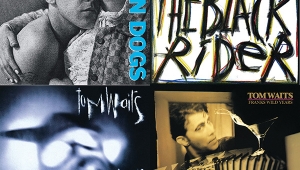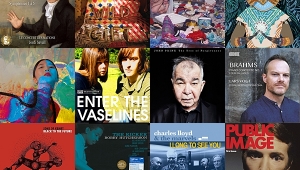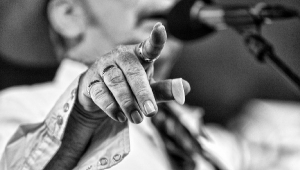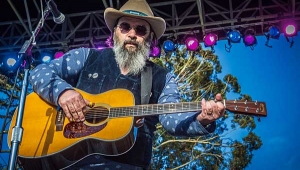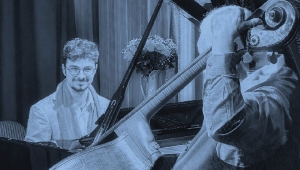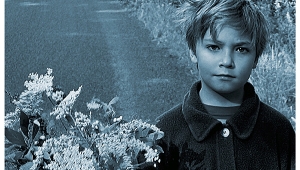| Columns Retired Columns & Blogs |
Robbie Fulks is Bringing It All Back Home Page 2

Photo by Will Byington
2001's Couples in Trouble, which he released on his own Boondoggle Records, was offputtingly eclectic. Even as The Washington Post's Geoffrey Himes hailed the record as Fulks's "most intimate, most ambitious work," Himes all but warned off potential buyers. "Before the record ends, the singer will try his hand at new-wave pop, art song, show tunes, troubadour folk, synth noise and honky-tonk." Sorry, too rich to digest. Fulks set out on a multi-album journey through classic hard country with 2001's ironically titled 13 Hillbilly Giants; its perverse conceit is to cover songs by lesser-known artists Fulks admired. The sole high-profile contribution is Dolly Parton's lugubrious weeper, "Jeannie's Afraid of the Dark." PopMatters called 13 Hillbilly Giants "impossible to market" and Fulks an "alternative country giant" in the same article.
In 2004, Fulks produced Touch My Heart: A Tribute to Johnny Paycheck, one of country music's great antiheroes, pulling together a properly stellar cast including George Jones, Buck Owens, Mavis Staples, and Neko Case. "Tributes rarely get better than this, a country music masterpiece," wrote Billboard's critic, calling Touch My Heart "Robbie Fulks's masterfully assembled set." Fulks wrote all 15 songs for 2005's Georgia Hard, a celebration of hard country of the '50s through the '70s, "leav[ing] no doubt," wrote AllMusic's Mark Deming, "that Robbie Fulks is as good a country songwriter as anyone working today."
An underrated singer, too. He soars on "Leave It to a Loser" (and subverts his triumph two songs later with the dopey "I'm Gonna Take You Home (And Make You Like Me)"). 2010 brought a sure-fire turnoff for Fulks's audience: Happy, 14 reimaginings of Michael Jackson songs, obscurities for the most part, released the year after Jackson's death (footnote 2). Whether with sonic assistance or not, at times Fulks's voice eerily resembles the King of Pop's. On a sinuously near-Eastern "Billie Jean," Fulks takes his time to explode in anguish, a superstar's rage at his fans' pathological demands; in this unexpectedly sympathetic impersonation, Fulks nervily accepts the challenge of looking at the world through Michael Jackson's eyes. Elsewhere, while Jackson's vow in "Man in the Mirror" to "make that change" came across as unconvincing, Fulks's does not.
Make that change he has. Rejuvenated by the new live format and his return to his acoustic roots, Fulks has, to paraphrase an English poet, sailed into an extraordinary mildness, anchored in his home. The Robbie Fulks of 2023 has abandoned, or at least tempered, that compulsive eclecticism, finally comfortable in his skin. "I consider myself a country artist first, but I would give the broadest definition of country. Doc Watson and John Hurt. Bill Monroe, Hank Williams, Webb Pierce. Honky-tonk, bluegrass, Western swing: it's all country. Bobby Charles sitting out in the middle of Louisiana writing 'Small Town Talk'—with The Band's Rick Danko, yet. Country is a musical culture, not a specific sound. Delbert McClinton. Lonnie Mack. Arthur Alexander—he was country soul.
"Country is at the core of what I am, it's the music that resonates with me the strongest and that my audience expects and wants. It took me a while to figure that out, because in some ways, I'm not that country a guy. I don't fully inhabit the role. Which accounts for a lot of the satirical tone in those early records: 'I'm in this world, but I'm also outside it, poking fun at it.' That's kind of died down for me; it becomes boring to keep harping on how I am this, but I'm also not. Why don't I just own it, be myself, and let things fall where they will?"

After a rowdy 2019 side trip into honkytonk country and rockabilly with Linda Gail Lewis, Jerry Lee's sister, Fulks is back on acoustic ground with the pandemic-delayed Bluegrass Vacation, featuring a Who's-Who of the genre, from young mandolin star Sierra Hull to bluegrass eminence and mandolinist Sam Bush, age 70, whom Fulks recalls hearing at the first bluegrass festival he attended, in Culpeper, Virginia, in 1973, Fulks a wide-eyed 10-year-old, Bush not much older.
Cutting a bluegrass album has long been on Fulks's mind. "Bluegrass has kind of snowballed for me," he said, "where maybe 10 or 11 years ago, I was working with [bassist] Mike Bub and [fiddler] Shad Cobb, and then I met more people, and at a certain point, it was like, 'Shit, I've got Sierra Hull on my contacts list, and [Hull's husband, multi-instrumentalist] Justin Moses, and all these others, and I've got to do this.'"
A few sessions in, Punch Brothers guitarist Chris Eldridge arrived, and Del McCoury Band mandolinist Ronnie McCoury, and standout bassist Dennis Crouch. "We cut 'Let the Old Dog In' and 'Silverlake Reel' that day," blisteringly fast tours de force, "and I went home and listened and had another of those jumping-up-and-down moments. The playing was so hot that I couldn't see going ahead without those three guys. I even recut some stuff with them. I'd never done anything like that, throwing stuff away and recutting it with new players, like it's some Mick Jagger project."

L-R: Todd Phillips, Chris Eldridge, Sierra Hull, Stuart Duncan, and Robbie Fulks.
The cast further expanded with dobro superstar Jerry Douglas, banjoist Alison Brown (who cofounded Compass Records, Fulks's new label), Stuart Duncan—perhaps Nashville's preeminent session fiddler—and the wonderful, sorely under-recognized Brennen Leigh, Fulks's female vocal partner on three tracks. Fulks wrote every song on the album except one: the Delmore Brothers' 1936 classic, "Nashville Blues," which he sings with yet another bluegrass luminary, multi-instrumentalist/vocalist Tim O'Brien. Although it's only February as I write this, Fulks's first bluegrass album will surely contend for this year's best bluegrass album Grammy.
Bluegrass Vacation's most affecting songs are reflections on the power of memory and tradition. "Molly and the Old Man" collapses three generations into three-plus minutes. "Cabin in the hollow/Tea kettle on the cookstove," Fulks sings over his guitar and Shad Cobb's fiddle, and the story begins, about a fiddler and his blue-eyed, banjo-playing wife, Molly, "pickin' on the 'Cluck Old Hen'" (hoariest of fiddle tunes, a version of which, as Fulks would know, was recorded in 1923, in Atlanta, by Fiddlin' John Carson, at what is generally considered country music's first recording session). Just 27, Molly dies in labor but leaves the old man with Molly Junior, born with a gift for the banjo. ("If you gotta go/Just make sure you leave a song behind.") The old man fiddles on "while his darlin' Molly Jr. plays the hell out of the banjo." (Enter Alison Brown.) Time passes, the old man dies, and Molly marries a fiddler, the new old man, and gives birth to a blue-eyed girl. The cabin falls down but no matter: "Memory is a mansion," and as the song ends, the old man rosins up his bow and he and Molly pick "Cluck Old Hen" as the baby claps in time.
Generations die, buildings crumble, the song lives on. We're a long way from "Fuck This Town." Thirty years ago, Fulks would have satirized the themes he now explores openheartedly.
"Angels Carry Me" is another backward glance. Buoyed by Sierra Hull's lapidary mandolin, it's Bluegrass Vacation's strongest song: haunting, sad, and wise, a lesson learned about the power of the past. It's autobiographical, Fulks told me; more accurately, it's quasi-autobiographical, a cautionary tale about a fate that Fulks considers himself lucky to have escaped, through song. "Angels Carry Me" starts with a kid growing up in the middle of nowhere, listening, transfixed, to the gods on the radio, singing their promises of fame and no farm work, "and that's how I became a star-struck fool/And a stranger to my old man." Escape the farm he does, for the West Coast and the big time: "That's me at the wheel and me on the radio/Sailin' down the 101." Irritatingly, his old man pays him a visit and is curtly told off: "Don't come around me and my friends up here/With your clodhoppers and your big dumb eyes/I go by my second name now." Blinded by success, the narrator fails to recognize that he's built his fame on nothing but songs about home—the woodpile, the creek, "the neighbor girl whose true intentions I never could quite read"—the roots that he despises. The chastened protagonist realizes, "Only a fool thinks he can leave just by driving away."
Bluegrass Vacation ends, appropriately, with just Fulks, singing his composition "Old Time Music's Here to Stay" and playing banjo, an instrument he doesn't often pick up anymore. He's frailing, the pre-bluegrass technique also known as clawhammer. "I decided fairly late in life, maybe about 2010, that I wanted to learn how to frail. It took four or five years of torturing audiences to get to where it wasn't embarrassing." Plunking away, a virtuoso eschewing virtuosity for front-porch basics, informing us that "[as I] watch the years unreeling, the more I get the feeling/Old-time music is here to stay."
The song, I told Fulks, struck me as a new personal manifesto, along the lines of, "Folks, in the end, I am a player of traditional music."
"Am I putting words into your mouth?" I asked.
"No," he replied. "That sounds about right."
Footnote 2: Only Robbie Fulks would release cover albums of Michael Jackson and Bob Dylan. Fulks's 2019 collection 16 is a deeply thought-out take on Dylan's 1978 Street-Legal, one of the bard's more obscure, less acclaimed, efforts, ie, right up Fulks's alley.
- Log in or register to post comments
